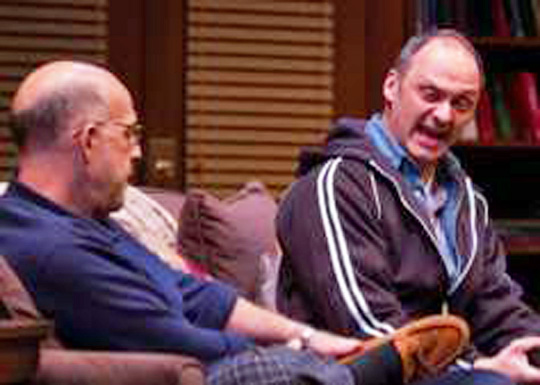
Any Given Monday by Bruce Graham. Delaware Theatre Company, 2014.
Driving on the expressway, haven’t you had moments when a reckless driver passes you on the right, then swerves into your lane and cuts you off and you feel a desire to see his car totaled? C’mon, fess up. Sure you have.
Alan Menken & Howard Ashman said it too in The Little Shop of Horrors, “[Do you] know anyone who deserves to be cut up and fed to a hungry plant? Sure you do.”
Mickey, one of the main characters in Bruce Graham’s Any Given Monday, now at the Delaware Theater Company in Wilmington, feels that way, and he takes it to an extreme. The wife of his best friend, Lenny, has found a lover and moved out. Lenny reacts passively and pines for her return. Mickey has to supply a much-needed response to this outrage.
But should he take out his anger against the woman whom Lenny still loves? Mickey has a better idea, and plots the cleverly reasoned murder of her lover.
Mickey (played superbly by Michael Mastro) is brash and quick to act. His friend Lenny (the persuasive Kenny Morris) is gentle. Even Lenny’s daughter, a philosophy major (Lucy DeVito), believes her father is too passive. The production succeeds because the relationship between the two men seems so natural. One is more intellectually accomplished (he’s a schoolteacher) but their attachment goes back to their childhood and is convincingly deep. The daughter is adorable, even when she over-analyzes whatever subject is at hand. Only the wife is unappealing and bordering on unbelievable.
Her husband is willing to welcome her return and continue as before, while his friend and his daughter want him to take her back but with a new, assertive attitude. The audience, on the other hand, is feeling “Don’t let her come back. To hell with her.”
Leslie Hendrix plays her like a hardened cheater, although the script says that this is her only infidelity in 24 years. True, the protagonists, the playwright and this viewer are all male and thus tend to side with the husband, but the drama works best when we feel some sympathy for the wife, and we empathize with her refusal to let a marriage become a tired habit.
Contrasts of religious beliefs and of morality abound here, while the dialogue is the funniest I’ve heard in any Graham play.
Graham cut about twelve minutes from his script after its Philadelphia premiere in 2010, and tightened the monologues. The new cast and Bud Martin’s direction definitely gives it a warmer glow. Mickey, in particular, is less boorish, more reasoned.
Much of the discussion plays out against a background of a Cowboys versus Giants football game on TV (hence the play’s title) with its glorification of aggression. I say discussion intentionally, because most of the play is commentary about actions that take place off stage. Thus, although funny, colloquial and contemporary, this script conjures the form of Greek tragedy.
Read other reviews on The Cultural Critic